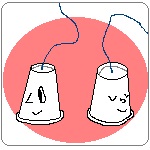風鈴さんの おぼえた日記 - 2023年4月18日(火)
| 26 | 27 | 28 | 29 | 30 | 31 | 1 |
| 2 | 3 | 4 | 5 | 6 | 7 | 8 |
| 9 | 10 | 11 | 12 | 13 | 14 | 15 |
| 16 | 17 | 18 | 19 | 20 | 21 | 22 |
| 23 | 24 | 25 | 26 | 27 | 28 | 29 |
| 30 | 1 | 2 | 3 | 4 | 5 | 6 |

この日記をフォローしているユーザ
この日おぼえたフレーズ(英語・中国語・ハングル)
おぼえた日記
Camille と Yûki のふだん使いのフランス語 mardi 18 avril
Leçon 8 Et il var ester combien de temps ?
で、どのくらいの間、いるの?
👨 Il veut rester chez nous pendant son voyage.
旅行中、私たちの家に滞在したがっているの。
●veut [vø] < vouloir [vulwaːr] ~したい want
📒 veut + 不定詞:~したい
rester [ʀɛsteレステ] 滞在する、とどまる remain , stay
chez [ʃeシェ] ~の家に at the home of
pendant [pɑ̃dɑ̃パンダン] ~の間に during
son [sɔ̃ソン] 彼の his
voyage [vwajaːʒヴォワヤージュ] m. 旅行、旅 journey , trip
👩 Je vois. だろうね。
Quand est-ce quil vient exactement ?
正確には、彼はいつ来るの?
●quand [kɑ̃カン] いつ when
●je vois. わかるよ、そうだろうね、なるほど(相づち)
je vois tu vois il voit nous voyons
vous voyez ils voient (voir 見える、の活用)
exactement [εɡzaktəmɑ̃エクザクトマン] adv. 正確には exactly
👨 Vers le 13 ou le 14 mai. 5月13日か14日ごろ。
●vers [vεrヴェール] ~のころに around
ou [u] or
mai [mεメ] m. 5月 May
👩 Et il va rester combien de temps ?
で、どのくらい滞在するの?
📒 va < aller + 不定詞:近接未来
●combien [kɔ̃bjɛ̃コンビャン] adv. どのぐらいの how long
temps [tɑ̃タン] m. 時間、時 time
👨 À peu près trois semaines, je crois.
3週間ぐらいだと思う。
●à peu près [apøprε] m. だいたい
semaine [s(ə)mεnスメヌ] f. 週 week
je crois < croire [krwaːr] だと思う think , believe
👩 C’est long ! 長いね!
Ce n’est pas un voyage a la japonaise.
そりゃ、日本的な旅行じゃないな。
●long(ue) [lɔ̃, lɔ̃ːɡロン ローング] adj. 長い long
📒 à la japonaise 日本流の、日本式の
👄 フランス語のリズムにのろう!Au rythme du français !
Quand est-ce qu’il vient exactement ?
→ quan [t]e c qu’il vien ex (x)ac te men ?
※ quand のあと est-ce que が来ると、quand の語末の子音字 d は、t の音でリエゾンする、そのあと que と il はエリジオンする
quand est-ce qu’il [kɑ̃ tεskil]
Et il var ester combien de temps ?
→ et il va res te com bien de tem ?
※ et 接続詞は独立して発音、残りは一気に
rester [ʀɛs-teレステ] r の音は舌を使わず、おなかから空気を出して、やさしく喉のうらを擦るイメージ。(ハ行に近い)
x [iks] の発音
後ろに母音が来ると [ɡz]
exactement [εɡzaktəmɑ̃エグザクトマン] adv.
examen [εɡzamε̃エグザマン] m. 試験 exam
後ろに子音がくると [ks]
excusez-moi [εkskyze mwa] ごめんなさい
📚 Et il var ester combien de temps ?
不規則動詞 venir [v(ə)niːr] 来る
je viens [vjɛ̃ヴィアン] tu viens [vjɛ̃] il vient nous venons [və.nɔ̃ヴノン]
vous venez [və.neヴネ] ils viennent [vjɛnヴィエンヌ]
※ 3人称複数のとき最後の n の音も聞こえる
疑問詞 combien [kɔ̃bjɛ̃コンビャン]:数量を尋ねる
1.値段を尋ねる:how much?
C’est combien ? それはいくらですか?
2.人数を尋ねる:how many?
Vous etes combien ? 何名さまですか?
Nous sommes quatre. 4名です。
3.何かの数量を尋ねる
combien de + 無冠詞名詞(可算名詞は複数)
combien de + 可算名詞 combien de croissants
●croissants [krwasɑ̃] m. クロワッサン(パン)
combien de + 不可算名詞 combien de lait
●lait [lεレ] m. ミルク
combien de + 母音で始まる名詞 combien d’eau
●eau [oオ] f. 水
📝 combien を使う
C’est combien ? それはいくらですか?
→ C’est 1000 yens. 1000円です。
① Vous êtes combien ? 何名様ですか?
→ Nous sommes deux. 私たちは2人です。
●nous sommes [sɔm]
② Vous avez combien de vélos ?
→ J’ai deux vélos.
●vélos [veloヴェロ] m. 自転車
ラジオ英会話 Lesson 12 発言タイプ:あいさつ②
あいさつへの応答
How are you doing? お元気ですか?
→ Fine, thanks. How about you?
元気ですよ、ありがとう。あなたは?
● fine 精神的にも体調も問題ない、スッキリ・濁りがない
![]() /english/phrase/282448
/english/phrase/282448
![]() /english/phrase/282449
/english/phrase/282449
How are you? 元気ですか?
→ Couldn’t be better. 絶好調です。
●これ以上よくはなれない→絶好調
→ Never been better. 最高です。
●これ以上よくなったことはない→最高
→ Very good. とても元気です。
How’s today treating you? 元気ですか?
●今日あなたはどのように扱っていますか
→元気ですか?
→ Can’t complain. まあまあです。
●文句はいえません→まぁまぁです
→ I’m all right. 元気ですよ。
How’re you doing? 元気ですか?
→ Not bad. まあまあです。
→ Pretty good. なかなかいいです。
●pretty かなり(very > pretty)
What’s up? (What’s new?) 元気?
→ Not much. (Nothing much.) 特に何も(いつもとおり、まぁまぁ)
※ What’s up? なにかあった?、I’m fine. では違和感ある、特に何もない、という受け答えになる。I'm .... でなく it's .... で答える。Nothing. だけだと、別に、とそっけないので much をつける。
内閣支持47%に回復 7か月ぶり不支持を上回る
調査2日目の4月15日には岸田総理の演説直前に爆発物が投げ込まれる事件が起きました。事件の前、15日正午までの集計では支持率は4割台でしたが正午以降の分の集計では5割に達していて事件が内閣支持率に影響した可能性があります。
https://news.yahoo.co.jp/pickup/6460546
岸田首相の左足数十センチのところに爆発物が転がり、煙をあげた。爆発物(筒状のもの)の破片は観衆の間をすり抜け、40メートル離れた屋根に突き刺さった。危なかった。














